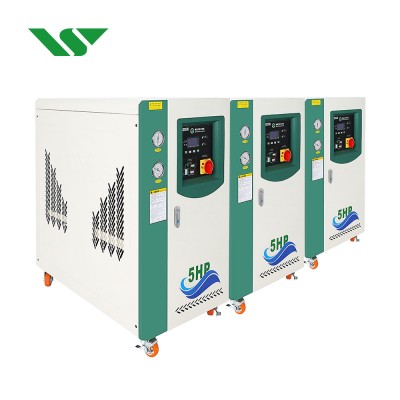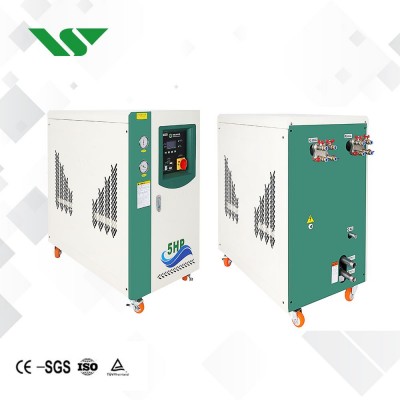Troubleshooting Insufficient Cooling in Industrial Chillers: Causes and Solutions
2024-10-14 Page view:
Introduction.
Industrial chillers play a vital role in many industries by providing cooling solutions to maintain optimal production conditions. However, over time, issues such as insufficient cooling capacity or slow cooling may arise. Identifying and resolving these problems promptly is essential to keep your operations running smoothly. In this article, we'll explore common reasons why industrial chillers may not cool effectively and provide actionable solutions.

Inadequate Insulation Leading to Cooling Loss.
One of the most frequent reasons for insufficient cooling in industrial chillers is the loss of cooling due to poor insulation. When the insulation on equipment or pipes is too thin or damaged, it can cause cooling loss, significantly affecting the chiller's performance.
If you notice moisture or frost on the surface of the insulation layer, this is a clear indicator of a problem. Addressing this issue by either adding insulation material or replacing damaged sections can help restore the system's efficiency. Additionally, leaks from poorly sealed doors or windows in air-conditioned spaces can contribute to the loss of cooling. Ensuring that all seals are intact will also reduce unnecessary cooling loss.
Air in the Refrigeration System.
The presence of air in the refrigeration system can severely disrupt the chiller's cooling capabilities. Even small amounts of air can interfere with normal operation, reducing the cooling capacity of the system. When installing a chiller, it is crucial to ensure that there is no air trapped in the unit, pipes, or water pump. If air enters the system, it can cause the water to flow improperly, leading to inefficient cooling performance. Removing any trapped air from the system and ensuring all components are correctly installed can prevent this issue from occurring.
Insufficient Pipe Insulation.
Another factor that can lead to slow cooling is inadequate pipe insulation. During installation, chillers are equipped with insulation material, typically cotton, around the evaporator and pipes to prevent cooling loss. However, if the insulation layer is insufficient or becomes damaged over time, cooling efficiency can drop significantly. Regularly inspecting the pipes and ensuring that they are properly wrapped with adequate insulation material will help maintain the system's performance.

Worn or Damaged Compressor Components.
The refrigeration compressor is the heart of any chiller. Over time, the moving parts of the compressor may wear down, leading to a decrease in cooling capacity. Gaps between the components may increase, or parts may become damaged, all of which affect the system's ability to deliver gas efficiently. Regular maintenance checks of the compressor are essential to ensure it operates at full capacity. Replacing or repairing worn components as soon as problems are identified can prevent further damage to the system.
Reduced Compressor Efficiency Over Time.
Even with regular maintenance, compressors can lose efficiency over time. As the moving parts wear down, or if the sealing inside the compressor weakens, the gas output may reduce, leading to a loss in cooling capacity. This issue can also be exacerbated by air trapped within the system, which can increase exhaust pressure and temperature, as well as power consumption. If you notice a decline in the compressor's performance, it may be time for repairs or a replacement to restore the chiller's cooling ability.

Overlooking Regular Maintenance.
Regular maintenance is key to preventing many of the issues that cause insufficient cooling in industrial chillers. Failure to perform routine checks can result in problems like worn components, air in the system, and reduced insulation effectiveness. Setting up a regular inspection schedule for your equipment will help identify issues early and allow for prompt corrective action. Maintenance not only extends the life of the chiller but also ensures it operates at peak efficiency.
Conclusion.
Insufficient cooling in industrial chillers can lead to operational disruptions, but with the right preventative measures and prompt solutions, these issues can be resolved effectively. By addressing key factors such as insulation quality, air in the system, and compressor efficiency, you can restore and maintain your chiller's cooling capacity. Routine maintenance plays a vital role in ensuring that your industrial chiller continues to operate smoothly, allowing your production processes to run without interruption.



